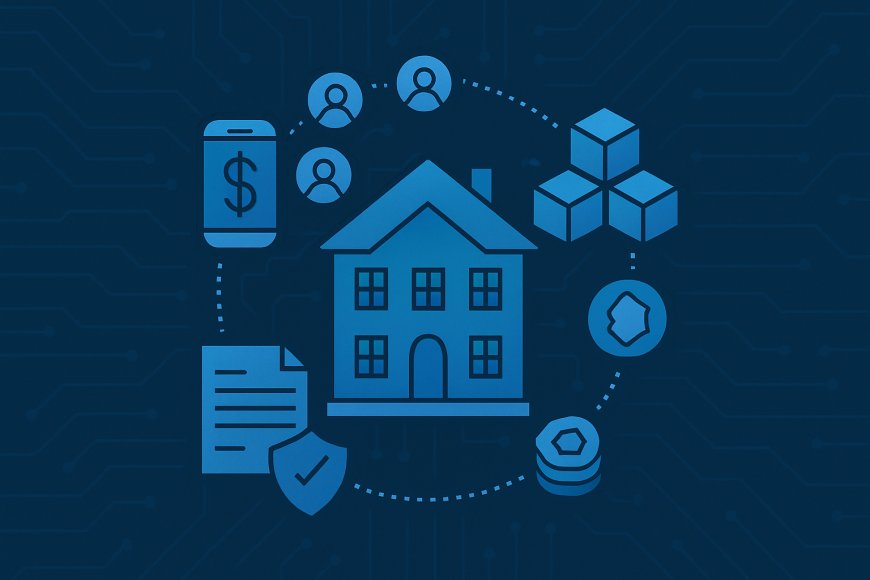What Is a Real Estate Tokenization Platform and How Does It Work?
Additionally, many platforms provide access to secondary markets, allowing token holders to trade their assets with other investors. Real-time dashboards and analytics are often integrated for transparency and performance tracking.

Real estate has long been regarded as one of the most stable investment vehicles, offering consistent returns and tangible value. However, the traditional real estate market is often riddled with barriers such as high entry costs, illiquidity, and lengthy transaction processes. The emergence of blockchain technology is now reshaping this landscape, and at the heart of this transformation is the concept of real estate tokenization platforms.
A real estate tokenization platform allows property assets to be divided into digital tokens, each representing a fractional ownership share in the underlying asset. These tokens are issued and managed on blockchain networks, making it easier, faster, and more secure for people to invest in property. But what exactly are these platforms, how do they work, and why are they gaining so much traction?
Understanding Real Estate Tokenization
Real estate tokenization refers to the process of converting the value of real-world property assets into digital tokens using blockchain technology. Each token represents a share of ownership or a claim on the asset's income. Unlike traditional real estate investments that require substantial capital, tokenization enables fractional ownership, allowing a wider range of investors to participate in property markets.
Tokenization doesn’t just simplify ownership—it also enhances liquidity. Investors can buy, sell, or trade these digital tokens on secondary markets or tokenization platforms, much like stocks or cryptocurrencies. This approach reduces friction in real estate transactions and opens up new investment avenues for both retail and institutional participants.
What Is a Real Estate Tokenization Platform?
A real estate tokenization platform is a blockchain-powered software system that facilitates the digitization, issuance, distribution, and management of real estate tokens. It serves as the technological infrastructure that enables property developers, asset managers, and investors to tokenize physical real estate and manage these digital assets with transparency and efficiency.
These platforms typically offer end-to-end support—from legal structuring and compliance to token creation and investor onboarding. By integrating blockchain protocols, smart contracts, and digital wallets, they ensure that transactions are secure, verifiable, and automated. In essence, these platforms are the backbone of the tokenized real estate ecosystem.
Core Functions of a Tokenization Platform
The primary goal of a real estate tokenization platform is to streamline the process of creating, distributing, and managing property-backed digital tokens. This involves a series of interlinked components and capabilities. First, the platform offers token creation services, where real estate assets are digitally modeled and broken down into blockchain-based units. These tokens are embedded with metadata such as ownership rights, dividend policies, and legal documentation.
Next, the platform facilitates investor onboarding through KYC/AML compliance tools, ensuring that only verified individuals can participate. Once verified, investors can purchase tokens via integrated payment systems using fiat currency or cryptocurrencies. The platform also enables the execution of smart contracts, which automate critical operations like dividend distribution, governance, and buyback clauses.
Additionally, many platforms provide access to secondary markets, allowing token holders to trade their assets with other investors. Real-time dashboards and analytics are often integrated for transparency and performance tracking.
How Real Estate Is Tokenized Step-by-Step
The tokenization process starts with the identification and legal assessment of the real estate asset. Legal entities such as Special Purpose Vehicles (SPVs) or Real Estate Investment Trusts (REITs) are often used to hold the asset and issue tokens against it. This ensures compliance with regional regulations and investor protection laws.
Once the legal framework is established, the next step involves asset valuation and token structuring. The asset’s total value is divided into a finite number of tokens. For example, a $10 million property might be tokenized into 100,000 tokens worth $100 each. These tokens can then represent equity ownership, income-sharing rights, or debt-based instruments, depending on the investment model.
Smart contracts are coded to automate transactions, define token-holder rights, and manage compliance rules. These contracts are deployed on blockchain networks like Ethereum, Polygon, or Binance Smart Chain. The final phase involves launching the token offering on the platform, where verified investors can purchase tokens and manage them through their digital wallets.
Benefits for Investors and Property Owners
Real estate tokenization platforms bring a host of benefits to both investors and asset owners. For investors, the most significant advantage is accessibility. They can gain exposure to high-value properties with a relatively small investment, enabling diversification across multiple assets and geographies. Moreover, the blockchain infrastructure ensures transparency in ownership records, transaction history, and income distribution.
Liquidity is another major benefit. Unlike traditional real estate investments that require months to liquidate, tokenized assets can be traded within seconds on secondary markets. This provides flexibility and makes real estate more attractive to short-term and medium-term investors.
For property owners and developers, tokenization platforms offer a new way to raise capital. Instead of relying solely on banks or large investors, they can unlock capital from a global pool of micro-investors. This not only democratizes access to capital but also speeds up the fundraising process. Additionally, the use of smart contracts reduces administrative overhead and eliminates the need for intermediaries, resulting in lower costs.
Regulatory Compliance and Legal Considerations
Tokenizing real estate assets is not merely a technical exercise—it also involves strict regulatory compliance. Each jurisdiction has its own securities laws, tax codes, and investor protection regulations that must be carefully navigated. Most real estate tokenization platforms work in tandem with legal advisors to structure the offering in a compliant manner.
In many cases, tokens are classified as securities and must adhere to frameworks such as the U.S. SEC’s Regulation D or Regulation S, or similar guidelines in Europe and Asia. Platforms must also incorporate KYC (Know Your Customer) and AML (Anti-Money Laundering) protocols to prevent fraudulent activity.
By integrating compliance features directly into the platform, issuers can automate investor verification, document management, and regulatory reporting. This not only ensures adherence to the law but also builds trust with investors.
Examples of Real Estate Tokenization Platforms
Several platforms have emerged as leaders in the real estate tokenization space, each offering unique capabilities. Platforms like RealT, SolidBlock, and Blocksquare have already facilitated numerous tokenized property offerings across the U.S., Europe, and the Middle East.
RealT, for instance, specializes in tokenizing rental properties in the U.S. and allows global investors to receive daily rental income through blockchain-based stablecoins. SolidBlock focuses on luxury and commercial real estate, while Blocksquare provides a white-label solution for property managers and brokers looking to launch their own tokenization platforms.
These platforms have demonstrated how blockchain can successfully bridge the gap between traditional real estate and modern investment technologies.
How Do Investors Buy and Trade Tokens?
Once a property is tokenized and available on a platform, investors can register, complete the verification process, and fund their account using fiat or crypto. After purchasing tokens, they receive digital certificates of ownership that are securely stored in blockchain wallets.
Some platforms offer direct buy-and-hold mechanisms, while others support secondary markets where tokens can be traded peer-to-peer. This allows investors to exit positions without waiting for the entire asset to be sold, as is typical in traditional real estate investment models.
Dividends or rental income are distributed automatically through smart contracts to token holders, based on their share of ownership. This transparent and automated process removes the need for intermediaries and speeds up settlement.
Challenges and Future Outlook
While the promise of real estate tokenization platforms is immense, the industry is still evolving. Regulatory uncertainty, technology adoption, and investor education are some of the challenges that need to be addressed. However, the growing interest from institutions and governments signals a bright future.
As tokenization platforms become more sophisticated, we can expect greater interoperability, improved user experience, and expanded access to global markets. The integration of AI, big data, and IoT with tokenized real estate could further enhance due diligence, property management, and valuation models.
More importantly, the mainstreaming of tokenized real estate can play a crucial role in solving problems related to housing affordability and investment inequality by breaking down high-value assets into affordable digital shares.
Conclusion
Real estate tokenization platforms are ushering in a new era of property investment—one that is more accessible, liquid, transparent, and efficient. By leveraging the power of blockchain, these platforms are eliminating traditional barriers and opening up real estate markets to a broader range of participants.
Whether you're an investor looking for diversified exposure or a developer seeking flexible fundraising options, understanding how real estate tokenization works is crucial. As technology continues to evolve, platforms that enable secure, compliant, and seamless property tokenization will become the new standard in real estate finance.
What's Your Reaction?
 Like
0
Like
0
 Dislike
0
Dislike
0
 Love
0
Love
0
 Funny
0
Funny
0
 Angry
0
Angry
0
 Sad
0
Sad
0
 Wow
0
Wow
0



























